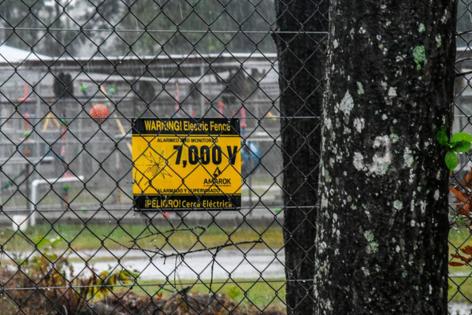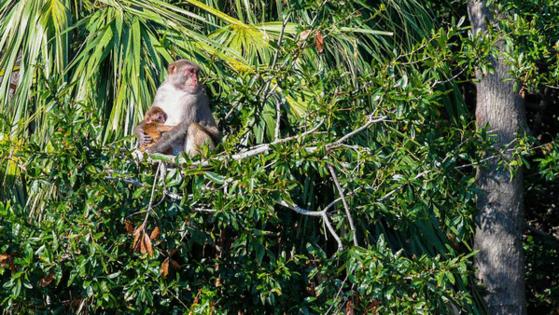Monkeys on the loose: Will escaped primates return to South Carolina research lab or will dart guns be necessary?
Published in News & Features
COLUMBIA, S.C. — Most of the 43 monkeys that escaped Thursday from the Alpha Genesis Primate Research Center are hanging out in the trees in the forest just beyond the facility’s fence line, the company’s owner said Friday morning.
The escaped monkeys continue to communicate with others primates that remain in the enclosure. Some of the escapees have been crossing back and forth between the fence that divides the Alpha Genesis’ property from the forest, said Greg Westergaard, Alpha Genesis’ CEO. “I can hear them at night, they make this little cooing sound. I could hear their little conversations going back and forth.”
Rectangular traps baited with apples and grapes — “all the good stuff they like” — have been placed near the forest where the animals are hanging out in the trees.
The approach the facility is taking to capturing the monkeys at this point, he said, is to leave them alone and hope they return on their own.
“The idea is you wait for them to miss their buddies and the treats and they will wander back,” Westergaard said. But if the monkeys are not caught in the traps or refuse to come back on their own, they will be shot with tranquilizing darts, he said.
If the public comes across the monkeys, they should keep their distance, Westergaard said. “Don’t try to chase them,” he said.
The rhesus macaque monkeys are adolescent females who are not aggressive and disease free — “about as clean as a monkey as you can have,” Westergaard said. “They are not likely to go after anything they see,” he said.
On Thursday, 43 of 50 monkeys escaped an enclosure when an employee doing routine cleaning and feeding failed to secure two doors behind her. The enclosure has a double-door system. “We train our people and all that but when push comes to shove that’s what happened,” Westergaard said.
That employee has been placed on a leave of absence for violating the safety protocols.
It is believed that most of the 43 monkeys that escaped remain as a group in an area between the facility and a forested area but there’s no way to know for sure because the trees make it difficult to count. They are being observed with binoculars.
With the recent escape, animal welfare groups have redoubled their criticism of Alpha Genesis’ facilities, a primate breeding and research facility in Yemassee 25 miles northwest of Beaufort. The critics’ concern is over the treatment of the primates at the same time the company defended the benefits of their work.
Dr. Lisa Jones-Engle, a PETA primate scientist, said she doesn’t believe “monkey experimenter Alpha Genesis” that the monkeys are free of disease. So-called pathogen-free monkeys in U.S. laboratories routinely have outbreaks of tuberculosis, bacterial pathogens that can cause dysentery, herpes B and E. coli, she said.
Even government-supported primate laboratories are chronically understaffed and poorly trained because few people are willing to collaborate in the ongoing imprisonment and abuse of monkeys, Jones-Engle said.
“Deprived of all that matters to them, these monkeys were leading a miserable existence — and now the 43 scared, cold, and hungry monkeys are on the loose,” Jones-Engle said in a statement. “The monkey experimentation industry has consistently failed to improve human health, and instead their actions continue to put the public at risk. NIH (National Institutes of Health) must end its funding for experiments on monkeys and Alpha Genesis must be shut down now.”
Research is effective in developing cures for human ailments, Alpha Genesis’ Westergaard said, “and we try to do the best we can for the monkeys unfortunately this was a human error.”
“We love the monkeys,” Westergaard said. “I’m just hoping we can get them back passively.”
Alpha Genesis manages three primate facilities in the Lowcountry. There are 4,000 monkeys at the main facility in Yemassee, where the escape occurred. A second facility on 80 acres is located just six miles north of Yemassee off Old Salkehatchie Road in Early Branch. There are 3,000 monkeys at that facility. It also manages another 3,000 monkeys for the National Institutes of Health on Morgan Island, which is located in Beaufort County off the coast 36 miles southeast of Yemassee and just north of St. Helena Island.
Monkeys at the three facilities are primarily used for biomedical research. Alpha Genesis’ primary customers are the federal government, pharmaceutical companies and universities. Some research does occur at the Yemassee facility.
This was not the first time monkeys have been on the loose in Yemassee, where there are more primates than people within the town limits. Before the Wednesday getaway, 45 monkeys had escaped the facility since 2014, but this marks the largest escape in the last decade.
The monkeys still had not been captured as 11 a.m. Friday morning, according to Town Administrator Matthew Garnes.
According to a news release from the Yemassee Police Department Thursday evening at 5:50 p.m., “Alpha Genesis currently have eyes on the primates and are looking to entice them with food.” According to the news release, the monkeys are believed to be in the wooded area surrounding the facility, locally known as “the monkey farm.”
©2024 The State. Visit thestate.com. Distributed by Tribune Content Agency, LLC.










Comments